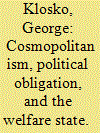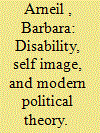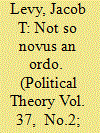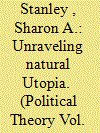|
|
|
Sort Order |
|
|
|
Items / Page
|
|
|
|
|
|
|
| Srl | Item |
| 1 |
ID:
087437


|
|
|
|
|
| Publication |
2009.
|
| Summary/Abstract |
While we generally take it for granted that governments should provide social welfare and other benefits to their citizens, justification of these services depends on special moral requirements people owe to their compatriots, as opposed to inhabitants of other countries, who may be far more needy. While widely discussed defenses of compatriot preferences can be seen to be flawed, the latter may be justified through a public goods argument. Security and other public goods are not only necessary for acceptable lives but are provided through the cooperative activity of compatriots, coordinated and enforced by the state. Because the necessary public goods require general cooperation throughout society, all individuals who are required to comply should have rights to participate in decisions about the form in which they are provided. Because these political rights must be substantive rather than merely formal, they justify requirements of distributive justice and so compatriot preferences.
|
|
|
|
|
|
|
|
|
|
|
|
|
|
|
|
| 2 |
ID:
087435


|
|
|
|
|
| Publication |
2009.
|
| Summary/Abstract |
Charles Taylor argues that recognition begins with the politics of "self-image," as groups represented in the past by others in ways harmful to their own identity replace negative historical self-images with positive ones of their own making. Given the centrality of "self image" to his politics of recognition, it is striking that Taylor, himself, represents disabled people in language that is both limiting and depreciating. The author argues such negative self-images are not unique to Taylor but endemic to modern political thought from John Locke to John Rawls, as the disabled ("irrational" and/or mentally disabled/ill people) are constituted in direct opposition to the rational person and/or citizen. Using contemporary social theories of disability, as articulated by disabled scholars and advocates, the author concludes that such negative self-images (and the binary of autonomy/justice and dependency/charity underpinning them) must be purged from political theory and replaced with an alternative theory of personhood/citizenship rooted in the image of interdependency.
|
|
|
|
|
|
|
|
|
|
|
|
|
|
|
|
| 3 |
ID:
087434


|
|
|
|
|
| Publication |
2009.
|
| Summary/Abstract |
Social contract theory imagines political societies as resting on a fundamental agreement, adopted at a discrete moment in hypothetical time, that binds individual persons together into a polity and sets fundamental rules regarding that polity's structure and powers. Written constitutions, adopted at real moments in historical time, dictating governmental structures, bounding governmental powers, and entrenching individual rights, look temptingly like social contracts reified. Yet something essential is lost in this slippage between social contract theory and the practice of constitutionalism. Contractarian blinders lead us to look for greater individualism, social unity, and coherence of principles than should be expected. Real constitutional orders appropriate, incorporate, and channel the histories and divisions of the societies they govern. Treating them as social contracts flattens and distorts them, making those engagements with the past or with social plurality appear anomalous and encouraging their minimization. Accordingly this article redirects attention to non-contractarian strands within constitutionalism's intellectual inheritance and lived practice.
|
|
|
|
|
|
|
|
|
|
|
|
|
|
|
|
| 4 |
ID:
087439


|
|
|
|
|
| Publication |
2009.
|
| Summary/Abstract |
Diderot's Supplement to the Voyage of Bougainville has often been read as a Rousseauian condemnation of modern civilization judged against the standard of pure Nature. A cursory reading of the Supplement does appear to present Tahiti as a natural utopia and Europe as a civilized prison. This essay rejects such a reading by demonstrating that the Supplement actually undermines any clear opposition between virtuous nature, represented by Tahiti, and corrupt civilization, represented by Europe. Although Diderot truly does offer a stinging critique of modern Europe, he refuses to offer "nature" as a redemptive alternative. Instead, the Supplement offers an implicit critique of the politics of moralism.
|
|
|
|
|
|
|
|
|
|
|
|
|
|
|
|
|
|
|
|
|